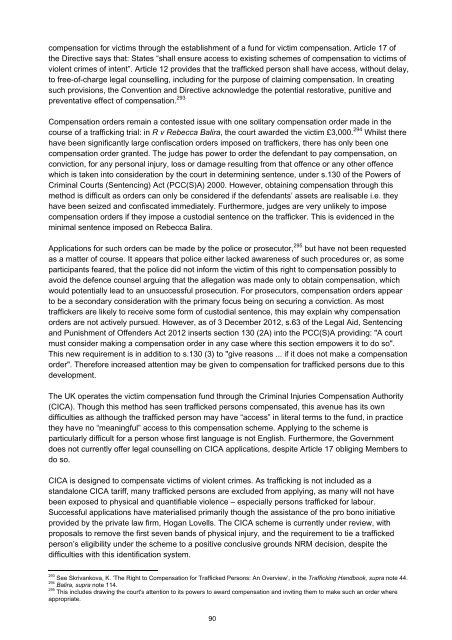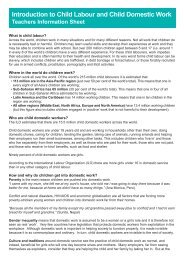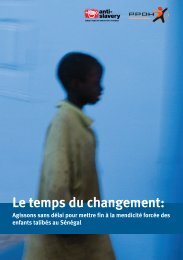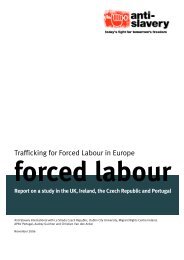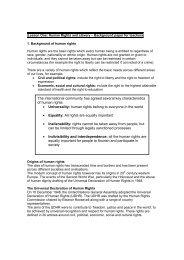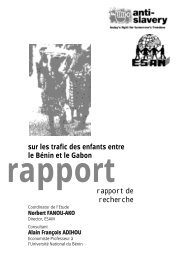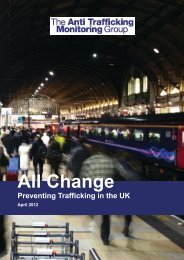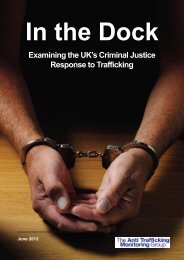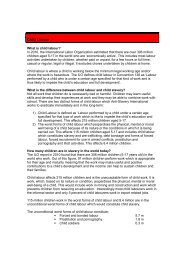In the Dock
Full report (1810.59KB) - Anti-Slavery International
Full report (1810.59KB) - Anti-Slavery International
You also want an ePaper? Increase the reach of your titles
YUMPU automatically turns print PDFs into web optimized ePapers that Google loves.
compensation for victims through <strong>the</strong> establishment of a fund for victim compensation. Article 17 of<strong>the</strong> Directive says that: States “shall ensure access to existing schemes of compensation to victims ofviolent crimes of intent”. Article 12 provides that <strong>the</strong> trafficked person shall have access, without delay,to free-of-charge legal counselling, including for <strong>the</strong> purpose of claiming compensation. <strong>In</strong> creatingsuch provisions, <strong>the</strong> Convention and Directive acknowledge <strong>the</strong> potential restorative, punitive andpreventative effect of compensation. 293Compensation orders remain a contested issue with one solitary compensation order made in <strong>the</strong>course of a trafficking trial: in R v Rebecca Balira, <strong>the</strong> court awarded <strong>the</strong> victim £3,000. 294 Whilst <strong>the</strong>rehave been significantly large confiscation orders imposed on traffickers, <strong>the</strong>re has only been onecompensation order granted. The judge has power to order <strong>the</strong> defendant to pay compensation, onconviction, for any personal injury, loss or damage resulting from that offence or any o<strong>the</strong>r offencewhich is taken into consideration by <strong>the</strong> court in determining sentence, under s.130 of <strong>the</strong> Powers ofCriminal Courts (Sentencing) Act (PCC(S)A) 2000. However, obtaining compensation through thismethod is difficult as orders can only be considered if <strong>the</strong> defendants’ assets are realisable i.e. <strong>the</strong>yhave been seized and confiscated immediately. Fur<strong>the</strong>rmore, judges are very unlikely to imposecompensation orders if <strong>the</strong>y impose a custodial sentence on <strong>the</strong> trafficker. This is evidenced in <strong>the</strong>minimal sentence imposed on Rebecca Balira.Applications for such orders can be made by <strong>the</strong> police or prosecutor, 295 but have not been requestedas a matter of course. It appears that police ei<strong>the</strong>r lacked awareness of such procedures or, as someparticipants feared, that <strong>the</strong> police did not inform <strong>the</strong> victim of this right to compensation possibly toavoid <strong>the</strong> defence counsel arguing that <strong>the</strong> allegation was made only to obtain compensation, whichwould potentially lead to an unsuccessful prosecution. For prosecutors, compensation orders appearto be a secondary consideration with <strong>the</strong> primary focus being on securing a conviction. As mosttraffickers are likely to receive some form of custodial sentence, this may explain why compensationorders are not actively pursued. However, as of 3 December 2012, s.63 of <strong>the</strong> Legal Aid, Sentencingand Punishment of Offenders Act 2012 inserts section 130 (2A) into <strong>the</strong> PCC(S)A providing: "A courtmust consider making a compensation order in any case where this section empowers it to do so".This new requirement is in addition to s.130 (3) to "give reasons ... if it does not make a compensationorder". Therefore increased attention may be given to compensation for trafficked persons due to thisdevelopment.The UK operates <strong>the</strong> victim compensation fund through <strong>the</strong> Criminal <strong>In</strong>juries Compensation Authority(CICA). Though this method has seen trafficked persons compensated, this avenue has its owndifficulties as although <strong>the</strong> trafficked person may have “access” in literal terms to <strong>the</strong> fund, in practice<strong>the</strong>y have no “meaningful” access to this compensation scheme. Applying to <strong>the</strong> scheme isparticularly difficult for a person whose first language is not English. Fur<strong>the</strong>rmore, <strong>the</strong> Governmentdoes not currently offer legal counselling on CICA applications, despite Article 17 obliging Members todo so.CICA is designed to compensate victims of violent crimes. As trafficking is not included as astandalone CICA tariff, many trafficked persons are excluded from applying, as many will not havebeen exposed to physical and quantifiable violence – especially persons trafficked for labour.Successful applications have materialised primarily though <strong>the</strong> assistance of <strong>the</strong> pro bono initiativeprovided by <strong>the</strong> private law firm, Hogan Lovells. The CICA scheme is currently under review, withproposals to remove <strong>the</strong> first seven bands of physical injury, and <strong>the</strong> requirement to tie a traffickedperson’s eligibility under <strong>the</strong> scheme to a positive conclusive grounds NRM decision, despite <strong>the</strong>difficulties with this identification system.293See Skrivankova, K. ‘The Right to Compensation for Trafficked Persons: An Overview’, in <strong>the</strong> Trafficking Handbook, supra note 44.294Balira, supra note 114.295This includes drawing <strong>the</strong> court's attention to its powers to award compensation and inviting <strong>the</strong>m to make such an order whereappropriate.90


